
Keen Kutter is a trade name first used by Simmons Hardware Company of St. Louis, Missouri in 1866. The name was adopted as a trademark by Simmons Hardware Company in 1870 and was used on their highest quality tools and cutlery.

Keen Kutter is a trade name first used by Simmons Hardware Company of St. Louis, Missouri in 1866. The name was adopted as a trademark by Simmons Hardware Company in 1870 and was used on their highest quality tools and cutlery.
Simmons Hardware Company was purchased by arch rival Shapleigh Hardware Company (also of St. Louis) in 1940. Shapleigh Hardware Company was known for their premium brand Diamond Edge. After Shapleigh acquired the Keen Kutter trademark it was modified by replacing the "E.C. Simmons" in the top of the logo with Shapleigh's (Fig. 6). Shapleigh continued to use the trademark on products until they went out of business in 1960.

After several years the Keen Kutter trademark was sold to Val-Test Distributors of Chicago, Illinois, a wholesale hardware buyers' group. Val-Test allows smaller wholesale hardware companies to order goods. The orders are combined with orders from other hardware companies allowing for quantity discounts from manufactures. After Val-Test acquired the trademark, they removed the "Shapleigh's" leaving the top of the logo blank (Fig. 7). Throughout the 60s, 70s and 80s, Keen Kutter knives were made for VAL-TEST by Schrade Cutlery Co. and in the 2000's, limited use of the Keen Kutter trademark was authorized for the manufacturer of knives by Frost Cutlery Co. and Bear and Sons Cutlery Co.. These knives are currently distributed by VAL-TEST.
The Keen Kutter trademark is currently privately held.
Items bearing the Keen Kutter trademark are considered collectible. There were numerous items produced which have cross collectibility. Pocket knives, hand tools, railway locks, and advertising items from Keen Kutter are of interest to many collectors. Jerry and Elaine Heuring, authors of Collector's Guide To Keen Kutter, have documented current values and general information in their books. The Hardware Companies Kollector's Klub founded in 1995 is another great source of information for Keen Kutter collectors. [1]
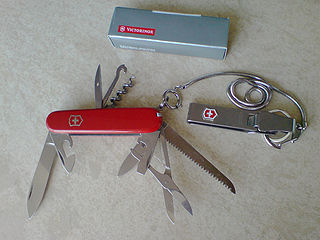
The Swiss Army knife is a pocketknife, generally multi-tooled, now manufactured by Victorinox. The term "Swiss Army knife" was coined by American soldiers after World War II after they had trouble pronouncing the German word "Offiziersmesser", meaning "officer’s knife".
Kutter may refer to:

A switchblade is a pocketknife with a sliding or pivoting blade contained in the handle which is extended automatically by a spring when a button, lever, or switch on the handle or bolster is activated. Virtually all switchblades incorporate a locking blade, where the blade is locked against accidental closure when the blade is in the open position. It is unlocked by a mechanism that allows the blade to be folded and locked in the closed position.

Victorinox is a knife manufacturer and watchmaker based in the town of Ibach, in the Canton of Schwyz, Switzerland. It is well known for its Swiss Army knives. The Swiss Army knives made by Victorinox are made of a proprietary blend hardened steel from Germany and France. Since its acquisition of rival Wenger in 2005, it has become the sole supplier of multi-purpose knives to the Swiss army. It is the world's biggest manufacturer of pocket knives; additionally, the company licenses its logo for watches, apparel, and travel gear.
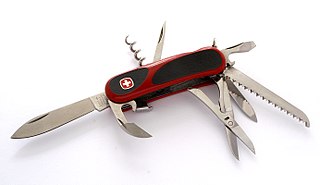
Wenger was a Swiss cutlery manufacturer that exists today as a brand of once-rival Victorinox, used for knives, watches and licensed products. Founded in 1893, it was best known as one of two companies to manufacture Swiss Army knives. Based in Delémont, Wenger was acquired in 2005 by Victorinox and partially absorbed. Since 2013 Wenger Swiss Army knives have been integrated in the Victorinox collection as the "Delémont collection".

The Camillus Cutlery Company is one of the oldest knife manufacturers in the United States. The Company was founded in 1876 and produced millions of knives until it filed for bankruptcy in 2007. Its brand name and intellectual property rights were purchased by Acme United Corporation, which re-launched the Camillus brand in May 2009 using modern materials.

Buck Knives is an American knife manufacturer founded in Mountain Home, Idaho and now located in Post Falls, Idaho. The company has a long history through five generations of the Buck family from 1902 to the present day. Buck Knives primarily manufactures sport and field knives and is credited with inventing the "folding hunting knife" and popularizing it to such a degree that the term "buck knife" has become synonymous with folding lockback knives, including those made by other manufacturers.
Sabatier is the maker's mark used by several kitchen knife manufacturers—by itself it is not a registered brand name. The name Sabatier is considered to imply a high-quality knife produced by one of a number of manufacturers in the Thiers region of France using a full forging process; the knives of some of these manufacturers are highly regarded. However, the name "Sabatier" came into use before intellectual property laws and is not protected; knives legally bearing the name range from high-quality knives made in France to cheap mass-produced products of poor quality from France and other countries; a registered logo or full name, or both, such as "65 Sabatier Perrier", is necessary to establish origin and quality.

Elmer's Products, Inc. or simply Elmer's, is an American-based company that has a line of adhesive, craft, home repair, and office supply products. It is best known as the manufacturer of Elmer's Glue-All, a popular PVA-based synthetic glue, in addition to other brands including Krazy Glue, ProBond and CraftBond adhesives, and X-Acto cutting tools.
Robert Waldorf Loveless, a.k.a. Bob Loveless or RW Loveless, was an American knife maker who designed and popularized the hollowground drop point blade and the use of full tapered tangs and screw-type handle scale fasteners within the art of knifemaking. He is cited by other knifemakers and collectors as one of the most innovative custom knife makers in the world.

Ken Onion is an American custom knifemaker based in Kaneohe, Hawaii, United States who invented the "SpeedSafe" assisted opening mechanism for Kershaw Knives. Ken Onion was the Premier Knife Designer for Kershaw Knives.
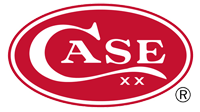
W.R. Case & Sons Cutlery Company is an American manufacturer of traditional pocket knives, fixed blades/sporting knives, kitchen knives, limited edition commemoratives and collectibles. The company originated in Little Valley, New York, around the turn of the 20th century, before relocating to its current home, Bradford, Pennsylvania, in 1905. The company's namesake, William Russell Case, first made knives with his brothers under the name Case Brothers Cutlery Company. His son, John Russell ("Russ") Case, worked as a salesman for his father's company before founding W.R. Case & Sons.
Imperial Schrade Corp. was an American knife manufacturer of hunting knives, pocketknives, utility knives, and bayonets during the 20th and early 21st centuries. The consolidation of five forerunner companies, including its namesakes, the Imperial Knife Company, founded 1916, and the Schrade Cutlery Company, founded in 1904, Imperial Schrade manufactured its products in the United States and Ireland and sold through hardware stores, department stores, and on military bases. The original company's fortunes declined and in 2004 it entered into bankruptcy where all equipment and intellectual property was sold off to reimburse creditors. The name and intellectual property was bought by Taylor Brands and used for marketing purposes.

The Western Knife Company was a manufacturer of hunting knives which began operations in Boulder, Colorado in 1911. The company is probably best known for its "Bowie" style hunting knives. The company was purchased by Coleman in 1984. Camillus Cutlery Company purchased Western in 1992. In February, 2007, Camillus closed as a result of bankruptcy due to competition from companies making cheaper knives in other countries. The Western brand and Camillus brand are now owned by the Acme United Corporation and manufactured in Asia.

The CQC-6 or Viper Six is a handmade tactical folding knife with a tantō blade manufactured by knifemaker Ernest Emerson. Although initially reported as the sixth design in an evolution of fighting knives and the first model in the lineup of Emerson's Specwar Custom Knives, Emerson later revealed that the knife was named for SEAL Team Six. It has a chisel-ground blade of ATS-34 or 154CM stainless steel and a handle made of titanium and linen micarta. The CQC-6 is credited as the knife that popularized the concept of the tactical folding knife.
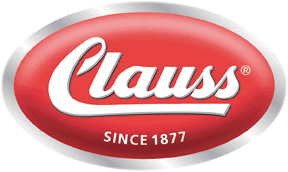
Clauss Cutlery is a cutlery brand owned by the Acme United Corporation since 2004. It was founded as Elyria Shear Works in 1877 by John and Henrie Clauss in Elyria, Ohio. At one time the company was the largest manufacturer of scissors and shears in the world.
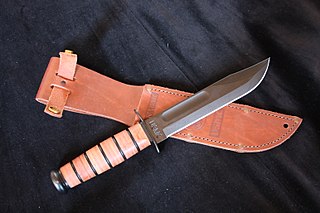
Ka-Bar is the contemporary popular name for the combat knife first adopted by the United States Marine Corps in November 1942 as the 1219C2 combat knife, and subsequently adopted by the United States Navy as the U.S. Navy utility knife, Mark 2. Ka-Bar is the name of a related knife manufacturing company, Ka-Bar Knives., Inc., of Olean, New York, a subsidiary of the Cutco Corporation.

The Keen Kutter Building is a former hardware warehouse located in Wichita, Kansas, that was added to the National Register of Historic Places in 2003. The four-story building has a free standing water tower that powered a water sprinkler system. The tower is an important landmark on the city's skyline. In 1999 the building was re-purposed as the Hotel at Old Town, which includes a large collection of Keen Kutter hardware on display.

The Simmons Hardware Company Warehouse, also known as the Battery Building, is a historic warehouse located in Sioux City, Iowa that is on the National Register of Historic Places. The six-story building covered a whole block and its construction was supervised by Frank Bunker Gilbreth, Sr., the time and motion study pioneer.

The Simmons Hardware Company was a hardware manufacturer based in St. Louis with locations in six states.